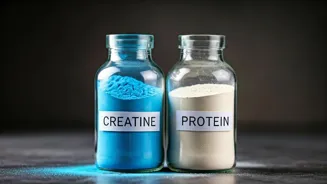Understanding Protein Powder
Protein powder is fundamentally a concentrated source of protein, a crucial macronutrient for muscle repair, growth, and overall bodily functions. Derived
from various sources like whey (milk), casein (milk), soy, rice, or peas, protein powder supplements your dietary protein intake. It's particularly beneficial for those who struggle to meet their daily protein requirements through whole foods alone, such as athletes, individuals undergoing intense training, or those with specific dietary restrictions. Protein helps rebuild and strengthen tissues, aiding in recovery after strenuous activity. The primary function of protein powder is to provide the building blocks needed for muscles to recover and grow after exercise, or to fulfill daily protein requirements to support general health and well-being. Choosing a protein powder involves considering the source, taste, digestibility, and any potential allergens or dietary preferences. It can be easily incorporated into shakes, smoothies, or even baked goods, making it a convenient option for those with busy schedules.
Creatine's Role in Fitness
Creatine, a naturally occurring compound found in muscle cells, primarily boosts strength and power during short bursts of high-intensity exercise. Unlike protein powder, which focuses on muscle building, creatine enhances the ability to generate energy rapidly. It does this by increasing the availability of ATP (adenosine triphosphate), the primary energy currency of the cells. Creatine supplementation has been shown to increase muscle mass, strength, and endurance. It helps muscles perform better during weightlifting or other high-intensity activities. Supplementing with creatine can improve performance during exercises that require short bursts of strength. It can also help with improved recovery between sets. It’s used and studied extensively by athletes for boosting their power output. Though creatine is naturally produced in the body and can be obtained through dietary sources like red meat and seafood, supplementation can significantly increase its concentration in muscles, leading to more substantial benefits for physical performance. Individuals often take creatine to boost their workout capacity and to promote overall gains in their physical capacity.
Key Differences Outlined
The core difference between creatine and protein powder lies in their functionality. Protein powder provides the amino acids, the building blocks for muscles, crucial for recovery and growth. Creatine, on the other hand, focuses on the energy production needed for short bursts of activity, directly impacting strength and power. Protein powder primarily helps in repairing and building muscle tissues. Creatine enhances the body's capacity to generate energy, boosting athletic performance in exercises that rely on explosive power. While protein is essential for general health and muscle repair after any exercise, creatine targets exercises demanding higher energy output, such as weightlifting or sprinting. Knowing these distinctions is important for anyone looking to augment their fitness regime. It helps determine the ideal supplement based on their personal goals, their training regime, and overall fitness objectives. Both supplements offer valuable advantages in the world of fitness, making the choice depend on one's specific aims.
Who Needs Which?
The choice between creatine and protein powder should be determined by individual fitness goals. Protein powder is an excellent choice for individuals trying to increase muscle mass, support recovery after exercise, or supplement their protein intake due to dietary restrictions or requirements. Bodybuilders, athletes, and anyone looking to build muscle or enhance overall recovery may find protein powder beneficial. Creatine is best suited for individuals seeking to increase strength and power, particularly those engaged in high-intensity, short-duration activities like weightlifting, sprinting, or sports that require explosive movements. Athletes looking to enhance their performance in such activities often include creatine in their regimen. For individuals starting their fitness journey, both supplements could be beneficial, with protein powder offering a foundational boost to recovery and muscle building and creatine enhancing the ability to perform and lift more weight. The best approach is to assess personal fitness goals and training regimen before selecting the most suitable supplement.
Incorporating Creatine and Protein
To maximize their benefits, both creatine and protein powder should be used appropriately. Protein powder is typically taken after workouts to aid in muscle recovery and growth. It can also be used as a convenient way to increase daily protein intake, particularly for those struggling to get enough protein through their diet. Creatine can be taken at any time of day, though some prefer to consume it before or after workouts. It can be mixed with water, juice, or other beverages. Consistent use is essential to achieve its benefits. It is often consumed in doses of 3-5 grams per day. Consistency is vital, as creatine's effects accumulate over time. For both supplements, following recommended dosages and staying hydrated is critical. They should ideally be incorporated as part of a balanced diet and workout plan to optimize their effects. Consulting with a healthcare professional or a certified nutritionist can provide personalized advice, especially for those with existing health conditions or specific fitness goals, ensuring safe and effective supplementation.
Possible Side Effects
While both creatine and protein powder are generally safe, potential side effects and considerations should be understood. Protein powder, particularly whey-based, can cause digestive issues in some individuals, like bloating or gas. Those with lactose intolerance might need to opt for lactose-free options like soy or pea protein. In rare instances, excessive protein intake can stress the kidneys, so it’s crucial to stay within recommended intake levels. Creatine is often associated with some water retention initially, leading to a temporary weight gain. Very rarely, it may cause digestive upset. It is always advisable to drink enough water to support kidney function and facilitate the effective use of the supplements. Always research and choose high-quality supplements from reputable brands. If any side effects are experienced, it is wise to consult with a doctor or a certified health professional. Responsible and well-informed use is key to realizing the benefits while minimizing potential adverse effects.














